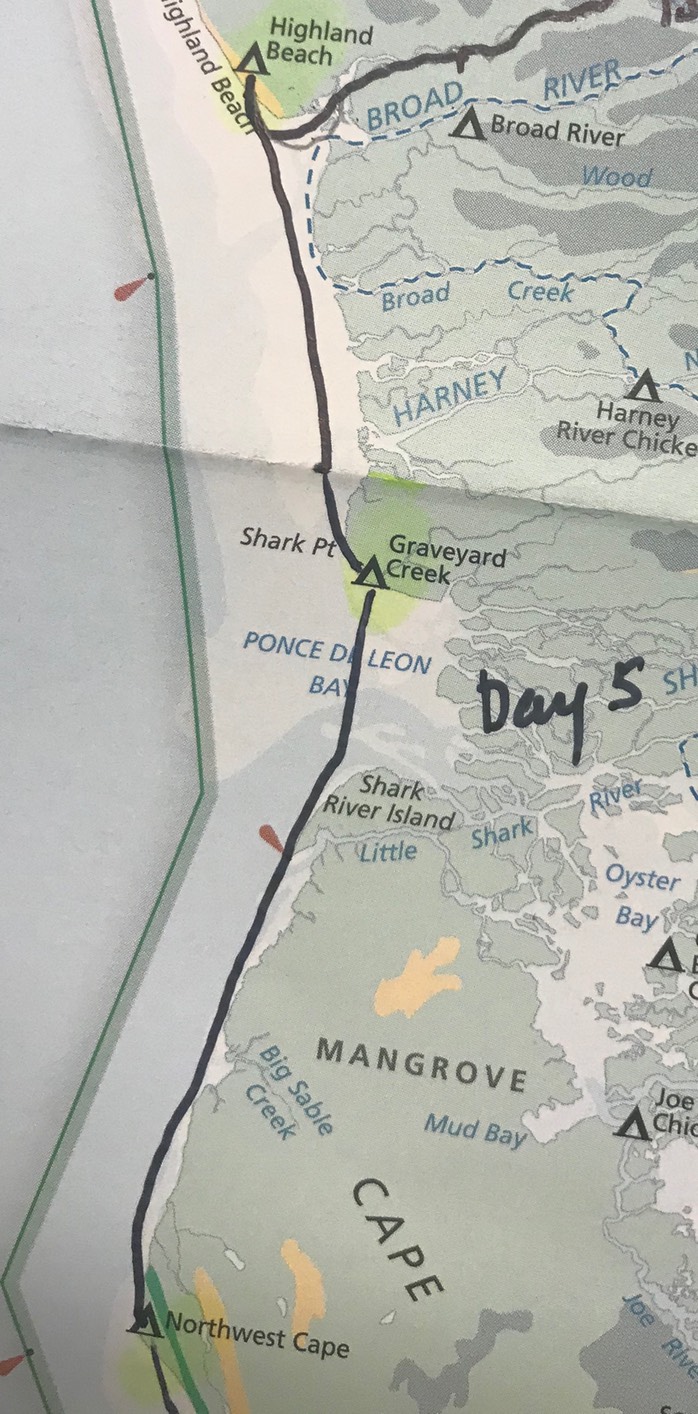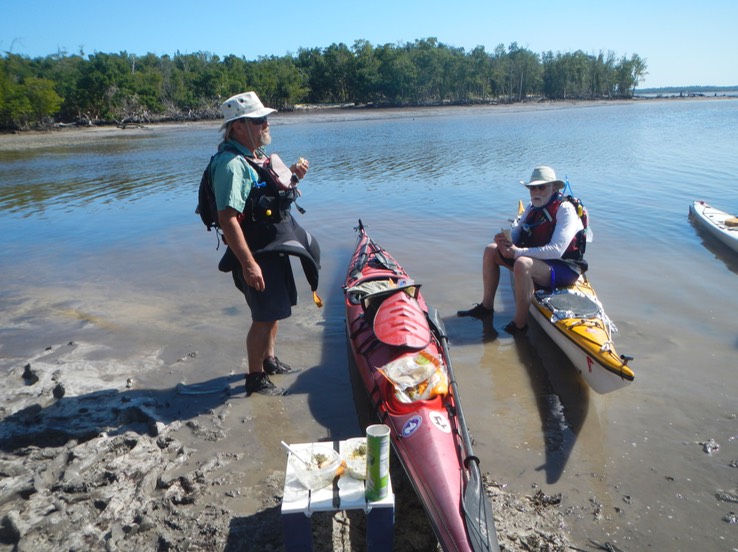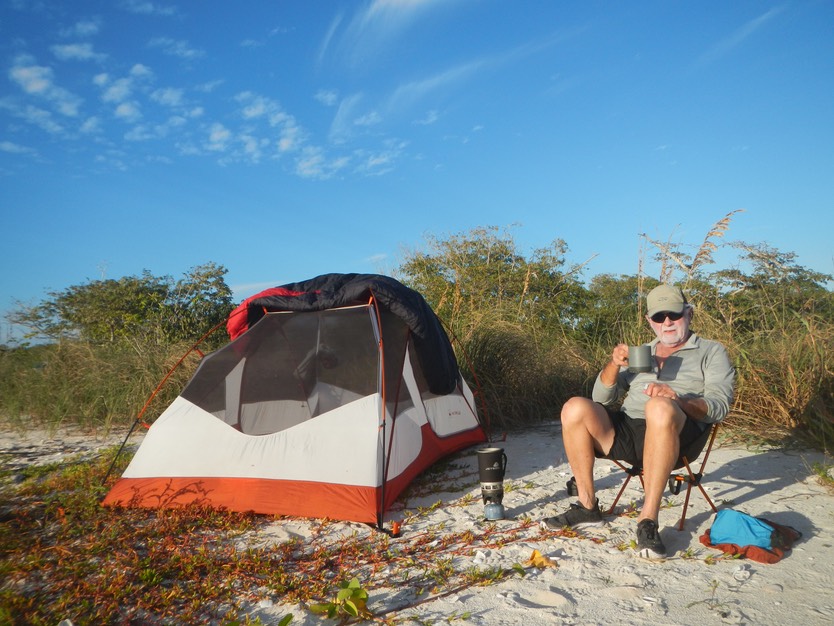Day 5: It was late when we all arose for breakfast. The night had been a little chilly, so I slept wearing my watch cap and kept a polartec sweater near by, just in case. We were in south Florida, but it was January and a cold front was expected.

We left Highland Beach around 10:45 am, late for us, especially since we might be facing a twenty mile day. Because our boats are often some distance from the water and heavily loaded, we use a four person carry to get them to where they will float. A four person carry puts one person on the bow, one on the stern and one on each side of the cockpit. This is really necessary as a way to minimize the possibility of injury.
The Gulf is shallow, so to get paddling depth we went some distance offshore. We headed southeast parallel to the coast in a following sea that hit my boat on its port rear quarter. I don’t really like paddling in a following sea because each wave tries to push your stern around so that you become parallel to the waves. This can make you vulnerable to a rollover capsize, so I had to throw a corrective maneuver into every stroke. It’s tiring and I was feeling really uncomfortable in the boat. But even though I felt like I was struggling, others told me that I kept my boat going straight as an arrow. We paddled about eight miles in this stuff before we tucked into Ponce De Leon Bay and found what was to be our campsite for the night, Graveyard Creek.
Graveyard Creek, the name says it all. It was desolate and miserable, most of it having been blown away in the last hurricane. The approach was over a shallow mud flat. We dragged our boats ashore and while some of us entered the site to take a look, others stayed with their kayaks. The dry land that was left was only twelve to eighteen inches above the bay, ending at the waterline in a vertical face. The best thing about the site was the porta-potti, which did get some use.
Even though this was supposed to be our home for the night, we had decided back at Highland Beach to bypass Graveyard Creek and press on for the camp at Northwest Cape Sable. We were anticipating some nasty weather tomorrow that might keep us from paddling. Northwest Cape was big enough to hold many people, so staying there for two days would not be a problem. However, if we stayed at Graveyard Creek a second day and another group was scheduled there, the site could not hold all of us. It was a good decision to paddle on to Northwest Cape, not just because Graveyard Creek was such a marginal campsite.

It was lunch time, so Joel got his little folding table out and set it up in the mud. As he prepared lunch for us the tide was slowly coming in. Soon our lunch table and the kayakers around it were standing in the water. Joel placed tortillas in outstretched hands. Cupping the tortilla in the hollow of a palm, we each scooped a spoonful of the mixture (I think it was salmon salad) into the center and folded it into a burrito, being very careful not to spill any of the precious filling into the muddy water below.
To the east of us, the Shark River flowed through many channels into Ponce Bay. Just beyond the Bay the Little Shark River entered the Gulf. We continued paddling southwest passing Big Sable Creek before turning slightly to the east to find the Northwest Cape Sable campsite, adding another twelve miles or so for a total of just under twenty miles for the day.
I don’t know if paddling conditions were better on this leg of the trip, or if I had just shaken off the funk I’d felt in the morning, but I was much more comfortable in my boat along this coast.
There wasn’t much to see. The only thing of interest was a series of little red pup tents, each one just big enough to hold one person. They were scattered at quarter mile intervals along the beach. Soon I began to notice a solitary person in the vicinity of each tent. I guessed these young people were part of an Outward Bound Group doing a required solo experience, spending at least twenty-four hours alone in the wilderness.
I find that paddling long distances in open water is much less enjoyable than paddling in rivers. In open water, there is usually less to see, and what you can look at is often far away, and tends to have a boring sameness about it. So I tune out. My mind goes inside and paddling becomes automatic, not really requiring much thought or attention. Conversation with other paddlers is the only thing that breaks the monotony, but I’m hard of hearing. I couldn’t use my hearing aids on the water, so talking was a limited pleasure because I often couldn’t understand what was being said. So, I lived in my head and talked to myself, putting my paddling on cruise control, hoping that we’d soon get to camp.
Northwest Cape was another long stretch of sand beach much like Highland. The campsite we chose backed up to a stand of trees that put us in the lea of the northeast storm winds expected that night and possibly tomorrow.
Once again I was down the beach from the others, along with Phil, who continued to isolate himself by setting up his tent some distance beyond me. I took special care in positioning my tent and staking it down to, hopefully, shed the heavy wind and rain when it came.

With that job done, I got out my chair and Jetboil and made an afternoon cup of coffee. I’m addicted, I admit it, but I did find that cup of brown nectar soothing in the late afternoon sun. The sky was still blue, but wispy fishtail and mackerel scale clouds were forming, an indication of a change in the weather sometime soon.
When we gathered around Joel and his propane campfire, Karol and Phil started slapping at bugs that I couldn’t even see. Every group that gathers outdoors needs a few Karols and Phils to draw all the biting insects away from the rest. For protection from the biting insects, Joel and Farley set about putting up Joel’s bug tent, a miraculous little thing that is very efficient at keeping the critters out. Joel also had two Thermacell propane mosquito repellant units that claimed to create a fifteen by fifteen foot barrier to keep mosquitos and noseeums away. The two things together kept us bug free until long after dark.
With the insects at bay, the wine drinkers made their daily white or red choices while we all made light conversation. Soon the sun was descending toward the western horizon, creating another spectacular sunset of red and orange and pink and blue colors splashed across a cadre of gathering clouds.
About this time, Joel grabbed a small bottle from his cooking provisions and, thinking it was olive oil, squirted some into the tortellini that was to be our dinner. It only took a second for him to realize that what he had added to our meal was dish soap! He was beside himself trying to figure out if there was any way he could somehow save the tortellini. There was not. But, Joel planned for emergencies. He had packed an extra dinner. Soon the tortellini was dumped and a new meal started. This time Joel buried the soap bottle deep in the kitchen bag so that he wouldn’t make the same mistake again.
Gathered in the little bug free cocoon, we ate our meal. After Phil had finished the leftovers, we began asking him about his work as a geologist. Phil had worked for oil companies all over the world assessing whether newly discovered oil fields were rich enough to make development profitable. He schooled us on how wells are drilled and managed, and all the steps involved in bringing a well into production. His discussion of fracking, how it was done, and the advantages and pitfalls of the process, was particularly interesting. Soon we could see the sky lighting up to our northeast. Far off soundless lightning was telling us the predicted storm was on its way. We all washed our plates, picked up our chairs and headed for the safety of our tents.
The Storm
The weather report warned of severe weather overnight. The dreaded storm would come from the northeast, accompanied by a cold front. I double checked all of my tent stakes, noting that I only had six sand stakes, when I needed eight, and twelve would have been better.
I finally crawled into my tent around 7:30 pm, sorted gear and did some chores. After that, I sat in my Crazy Creek chair and began to read, very aware of the flashing of distant lightening high up in the sky and the now just audible rumbling of thunder. Around 9:00 pm I turned in and drifted off to sleep.
The storm hit about 11:30 pm. It didn’t arrive gradually and build into something big. Instead it hit like a hammer. I was jolted awake by bright flashes of lightening, accompanied by thunder, and driving rain that sounded like the whole tent was being sprayed with BB’s. But the worst thing was the wind. I watched the tent shake and flex, leaning away from the wind. I could see that one of the tent’s four supports was bending so badly that I thought it might break. I quickly rushed to brace it by placing my back against the support. The wind and rain blasting against my back were cold and damp. A wet spot began to form on my tee shirt as the outside cold and the warmth of my body caused condensation. The tent rattled and shook, but still it stood. Wind driven rain began to seep through closed roof vents and dampen my sleeping bag. I quickly reached for it, folding it in half and pushing it out of danger. In the dark I could read the writing on my rainfly with each brilliant flash of lightening. My overhead lamp, hanging by a hook, danced and swung in wild arcs when I finally turned it on. I sat there, cold and damp, back against the thrashing tent support, praying that there would be no lightening strike anywhere in camp.
The storm lasted about an hour and a half, then moved on. My tent, my safe haven, was fully intact, save for a damp sleeping bag and some water on the floor. When the wind and rain had almost stopped, I heard voices. Joel and Farley were going tent to tent checking to see that everyone was alright. Everyone was okay, but joe’s tent had two inches of water in it and a sleeping bag so wet he could wring out. All of Rebecca’s tent stakes had pulled out, so the only thing keeping her tent from blowing into the Gulf was the weight of her gear and body. Both she and the tent survived. We all mopped up water and wrung out gear before finally crawling into our damp bags, trying to sleep. In the morning we remembered those solo Outward Bound kids in their little pup tents and wondered how they made out.
This video shows what it was like in the dark of my tent with the lightening storm raging.
This is a video made from inside my tent during wild night time storm lasting about two hours.
This video and the one above, provide a summary of our longest and most challenging day.
Next Page: To East Cape and a Decision